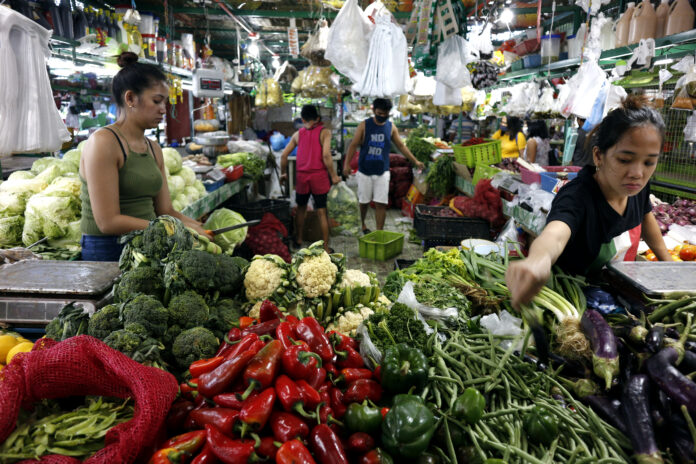Food-driven high inflation, averaging a three-month high of 2.5 percent in November, is forecast to average no higher than 3.1 percent in December, the Bangko Sentral ng Pilipinas (BSP) said on Friday.
In its month-ahead forecast, the BSP said the outcome of the still ongoing price survey should show the inflation rate settling within the forecast band of 2.3 percent up to 3.1 percent. This is well within the 2 percent to 4 percent band targeted by the monetary authorities this year.
More importantly, the rate at which prices change should round the year to no more than 3.2 percent or well within the official target.
The forecast acknowledges the upward pressure on prices seen arising from increased prices of major food items traced to the supply disruptions from recent weather disturbances. This impetus is made worse by adjustments in electricity rates and on petroleum prices.
But according to the BSP, this upward pressure is made up for and compensated by lower prices on agricultural products like rice helping keep the overall inflation rate within check.
In any case, what should prove critical is how core inflation plays out in December given that this metric that excludes certain food and energy prices pushed ahead to 2.5 percent in November.
Also, the intergovernmental Development Budget Coordination Committee (DBCC), in a meeting held early this month, confirmed its decision to retain the country’s inflation target range of 2 to 4 percent for the years 2025 to 2028. This was made in consultation with the BSP, marking a significant move toward stabilizing inflation expectations in the medium term.
The decision to set a medium-term inflation target is designed to strengthen the BSP’s forward-looking approach to monetary policy, which aims to anchor inflation expectations around the target. This policy is crucial in fostering a stable economic environment, as it provides businesses, consumers, and investors with clear signals about the expected trajectory of inflation over the coming years.
The target range continues to be deemed appropriate for the economy, considering the country’s current economic structure and macroeconomic outlook. Despite some upside risks, inflation projections for the coming years remain manageable, with expectations for aggregate demand and supply-side conditions remaining relatively stable.
The government also highlighted that inflation expectations remain anchored to the 2 to 4 percent target. Positive economic dynamics such as easing monetary conditions, an improving labor market, and the ongoing implementation of investment-enhancing structural reforms are expected to support aggregate demand. These factors contribute to a relatively stable inflation outlook, though risks stemming from both domestic and global shocks continue to warrant vigilant monitoring.
“The inflation target of 2.0-4.0 percent remains central to our strategy for ensuring price stability, which is fundamental for fostering sustainable economic growth and employment,” said Finance Secretary Benjamin Diokno. “By maintaining this target range, the DBCC and the BSP aim to provide clarity and confidence for businesses and consumers alike, while also ensuring that our monetary policy remains flexible enough to address any emerging challenges.”
Looking ahead, the DBCC, in coordination with the BSP, will continue its annual review of macroeconomic trends and potential structural shifts to assess whether the inflation target remains appropriate. The results of the BSP’s review of its monetary policy framework in 2025-2026 will also be factored into future assessments of the target.
In the coming years, the BSP will continue to focus on safeguarding price stability, which is seen as essential to achieving balanced and sustainable economic growth. By doing so, the central bank aims to support not just the stability of prices but also employment, which are key components of the country’s broader economic development goals.
The decision reflects the government’s commitment to sound fiscal and monetary management, ensuring that inflation remains within a manageable range to support long-term economic stability.







